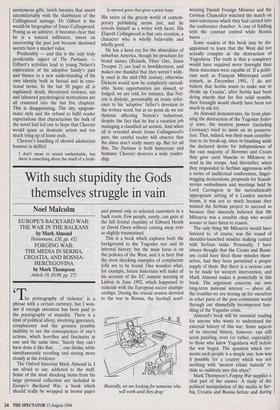Beyond the woolly mammoth
Charlotte Moore
THE PARTISAN by Benjamin Cheever Hamish Hamilton, £15.99, pp. 261 Benjamin Cheever's endearing second novel examines familiar subjects — loyalty, rivalry, the way principles fall victim to the compromising power of money — but the tone and setting of The Partisan are suffi- ciently quirky to provide a sense of fresh- ness and immediacy that lasts almost to the end.
The story is told by 19-year-old Nelson Ballard, a latter-day Holden Caulfield with- out the ego, whose life has been unwittingly stymied by his guardian Jonas Collingwood, respected but impoverished author of '18 gloomy novels'. Nelson, Jonas, Jonas' wife Elspeth, and Nelson's luscious and witty sister Nar — short for Narcissus — live on the Rockefeller estate in Westchester in a kind of time capsule. While late-20th-cen- tury consumer culture roars and whizzes about them, they eschew television, their car doesn't work properly, and they persist in borrowing books from the Mount Pleas- ant public library.
Nar grumbles that they should be
put on display in the Museum of Natural History. Right between the woolly mammoth and the diorama of the Hunters and Gather- ers. They could put our living room in a glass case: The Readers—
but their existence does present an idyll of a sort. The snake in their Eden, and the impetus of the story, arrives in the shape of Doctor John Gilbert, at first the sender of anonymous gifts, lavish luxuries that assort uncomfortably with the shabbiness of the Collingwood ménage. Dr Gilbert is the would-be biographer of Jonas Collingwood. Posing as an admirer, it becomes clear that he is a natural infiltrator, intent on uncovering the past just because disclosed secrets have a market value.
Predictably — and this is the only truly predictable aspect of The Partisans — Gilbert's activities lead to young Nelson's exploration of his adoptive family's past and thence to a new understanding of his own identity both in factual and in emo- tional terms. In the last 50 pages all is explained; death, threatened violence, sex and laboured psychological motivations are all crammed into the last five chapters. This is disappointing. The dry, epigram- matic style and the refusal to fulfil reader expectations that characterises the bulk of the novel had led one to hope that Cheever would spare us dramatic action and too much tying up of loose ends.
Cheever's handling of shrewd adolescent humour is skillful: I don't mean to sound uncharitable, but there is something about the smell of a fresh-
ly opened grave that gives a priest hope.
His satire of the greedy world of contem- porary publishing seems just, and he reveals himself as a writer with heart. His Elspeth Collingwood is that rare creation, a character who is wholly believable and wholly good.
He has a keen eye for the absurdities of suburban America, though his penchant for brand names (Rolaids, Fiber One, Isuzu Trooper 2) can lead to bewilderment, and makes one thankful that they weren't wide- ly used in the mid-19th century, otherwise Dickens would now be completely unread- able. Some opportunities are missed, or fudged; we are told, for instance, that Nel- son is dyslexic, presumably an ironic refer- ence to his 'adoptive' father's devotion to the written word, but at no point do we see dyslexia affecting Nelson's behaviour, despite the fact that he has a vacation job managing a classified ad section. And when all is revealed about Jonas Collingwood's past, the careful reader will observe that the dates don't really marry up. But for all this, The Partisan is both humorous and humane; Cheever deserves a wide reader- ship.











































 Previous page
Previous page